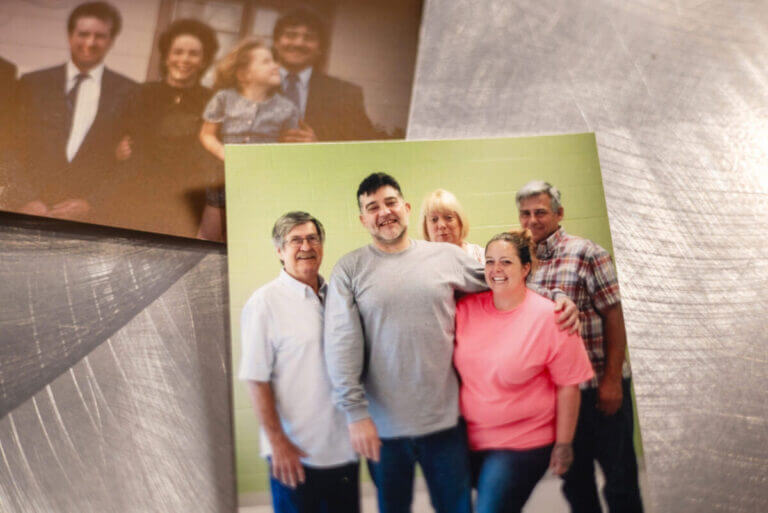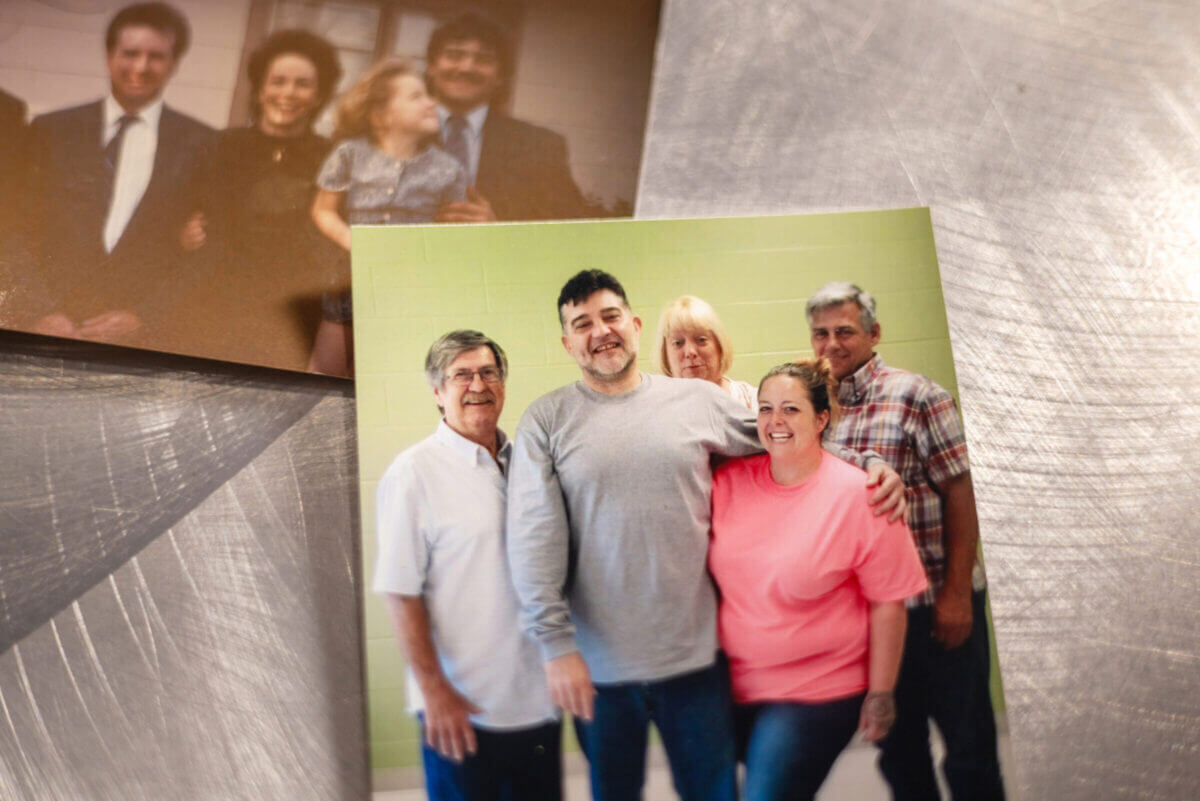

After more than 25 years on death row in Louisiana, Jimmie Duncan inched one step closer to freedom Friday when Judge Alvin Sharp of the 4th Judicial District in Ouachita Parish granted him bail, setting it at $150,000.
The decision comes nearly seven months after Sharp vacated Duncan’s 1998 first-degree murder conviction for killing his former girlfriend’s 23-month-old daughter, Haley Oliveaux, finding that it was based in part on bite mark evidence now considered by experts to be junk science.
The Ouachita Parish District Attorney’s Office has opposed Duncan’s release, arguing that Duncan is guilty of the murder. But in his bail ruling, Sharp pointed to evidence that the girl, who drowned, was at risk of seizure, meaning she could have died accidentally while in the tub. Sharp also noted the lack of blood or semen at the scene, contradicting the state’s position that Duncan raped Haley. And, he wrote in the ruling, there was a video, not presented at the trial, that Duncan’s legal team has alleged is evidence that — along with being based on debunked science — the bite-mark analysis in the case may have been fabricated.
The “presumption is not great” that Duncan is guilty, Sharp said.
“This ruling acknowledged the clear and convincing evidence showing that Mr. Duncan is factually innocent,” his attorneys said in a prepared statement. “Although Mr. Duncan’s ordeal is not over, today marks a significant step forward for Mr. Duncan’s complete exoneration.”
His attorneys said they were working to get Duncan out of prison over the weekend.
This week’s ruling is yet another chapter in a nearly three-decade legal odyssey that has spotlighted Louisiana’s troubling history with wrongful convictions, as well as its long-held reputation as one of the country’s most punitive states.
As ProPublica and Verite News reported in March, Duncan’s conviction was based largely on now discredited bite mark evidence presented by forensic dentist Michael West and pathologist Dr. Steven Hayne, whose longtime partnership as state experts has been questioned following concerns about the validity of their techniques. West and Hayne also worked on several disputed court cases in Mississippi.
Over the past 27 years, nine prisoners have been set free after being convicted in part on inaccurate evidence given by West and Hayne. Three of those men were on death row. Duncan was the last person awaiting an execution based on the pair’s work.
Duncan, 56, has maintained his innocence since first being arrested in 1993 after Haley’s death. In the ensuing years, Haley’s mother, Allison Layton Statham, has come to support Duncan’s release. At Duncan’s first bail hearing in July, Statham testified that she believes Duncan to be innocent and demanded his release from prison.
Efforts to free Duncan have become even more urgent given the state’s recent moves, under conservative Gov. Jeff Landry, to restart executions following a lapse of more than a decade.
Louisiana had not carried out a death sentence since 2010 as it has been unable to procure the drugs necessary for an execution. To overcome that obstacle, the state Legislature, at Landry’s urging, recently approved an alternative method: the use of nitrogen gas, a controversial method allowed in only three other states.
That opened the door to Louisiana’s first execution in 15 years. And on March 18, the state used nitrogen gas to put Jesse Hoffman Jr. to death.
To criminal justice reformers, Landry’s execution push is even more concerning given the state’s history in convicting and sentencing to death people later found to be innocent. In the past three decades, the state has exonerated 11 people facing execution, among the highest such numbers in the country, according to The National Registry of Exonerations.
Despite Sharp’s finding in April that Duncan is factually innocent, Ouachita prosecutors continue to insist that Duncan raped and murdered Oliveaux and should be executed without delay. The district attorney’s office, in urging Sharp to keep Duncan locked up, has argued that Duncan is “a safety risk to not only the victim’s family, but also the general public.” The office has appealed the decision to the Louisiana Supreme Court.
Duncan was arrested Dec. 18, 1993 after he reported finding Haley’s lifeless body floating in the tub of the home he shared with the girl’s mother in West Monroe. Duncan, who was babysitting that night, told authorities he had put the toddler in the tub to take a bath, then went downstairs to wash dishes. When he heard a noise coming from the bathroom, he rushed upstairs to check on her and found Haley floating face down in the water. She was pronounced dead a few hours later.
Prosecutors enlisted the assistance of Hayne, who had worked on hundreds of criminal cases in Mississippi and Louisiana over his decades-long career. Hayne conducted Haley’s medical exam and claimed he found evidence that she was sexually assaulted and intentionally drowned. He also claimed he found bite marks on her body.
Hayne’s frequent partner, West, then analyzed the marks and found that they were a match for Duncan’s teeth. Based in part on those findings, Duncan was charged with first-degree murder. After about two weeks of testimony in 1998, the jury found Duncan guilty and sentenced him to death.
Duncan’s post-conviction attorneys, however, later uncovered a trove of evidence which, they said, proves he is innocent and was wrongfully convicted, the most damning of which calls into question whether the bite marks Hayne said he found on Haley’s body were manufactured.
In a video of West’s 1993 examination of Haley — which was not shown to jurors at the trial — the dentist can be seen taking a mold of Duncan’s teeth and grinding it into the girl’s body. (West has previously said he was simply using what he called a “direct comparison” technique — in which he presses a mold of a person’s teeth directly onto the location of suspected bite marks.)
In his April ruling vacating Duncan’s conviction, Sharp said the work Hayne and West did on Duncan’s case was “no longer valid” and “not scientifically defensible.” Sharp also stated in his ruling that he found “very compelling” the September testimony of an expert medical witness who said that the child’s death was not the result of a homicide but of an accidental drowning. Prior to her death, Haley suffered several head injuries that could have caused seizures resulting in her drowning, according to the testimony.
Robert S. Tew, district attorney for Ouachita and Morehouse parishes, has argued that despite experts now dismissing bite mark evidence as “junk science,” it was an accepted methodology at the time of Duncan’s trial and that some experts still consider it to be valid. He has also noted that Hayne, who died in 2020, served as the pathologist for the district for over a decade and during that time “there has been no cases overturned because of Dr. Hayne’s autopsy.”
Tew’s office did not immediately respond to a request for comment.
An initial bail hearing for Duncan held in July was delayed after prosecutors filed a motion to recuse Sharp, claiming he was biased given his earlier decision to set aside Duncan’s conviction. Sharp declined the request. In an October ruling, the Louisiana Supreme Court rejected the state’s appeal in a 6-1 vote. The court has yet to take up the state’s appeal of Sharp’s decision to set aside Duncan’s conviction.
As of publication time, it was not clear when Duncan may be released.
- State fire marshal is investigating troubled Unit 29 at Parchman prison - February 26, 2026
- Mississippi’s Winter Storm Fern losses exceed $107 million, state insurance department says - February 26, 2026
- DNA evidence linked to a Greenville homicide is missing. Now the finger-pointing begins - February 26, 2026